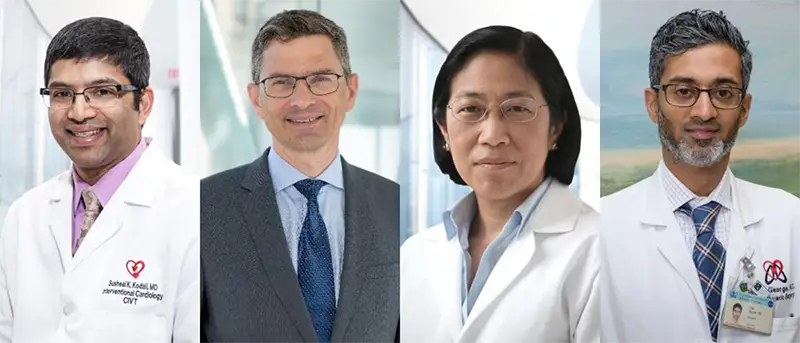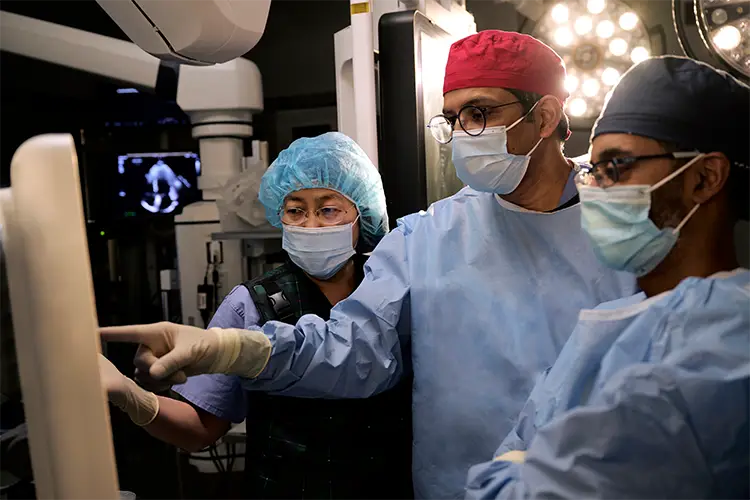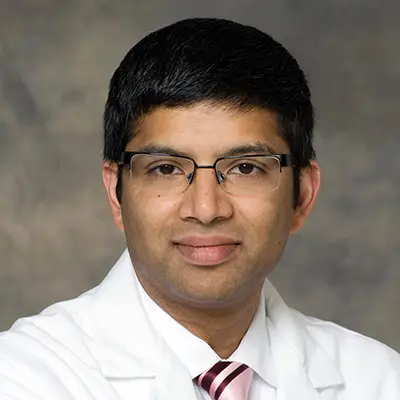In June 2024, NewYork-Presbyterian and Columbia opened a new Mitral & Tricuspid Center, which leverages the expertise of specialists from a variety of cardiovascular disciplines to improve care for patients with all stages of mitral and tricuspid valve regurgitation and stenosis.
The new center’s focus adds to NewYork-Presbyterian and Columbia's already world-renowned valve care, which includes pioneering transcatheter aortic valve replacement (TAVR). Diseases of the mitral and tricuspid valves are actually more common than aortic valve disease, but until recently they have had fewer treatment options.
Treatment for mitral valve disease, which may be associated with atrial fibrillation, heart failure, rheumatic disease, and other conditions, can include pharmacotherapy, the implantation of transcatheter devices, or surgery, including robotic mitral valve surgery. For patients with tricuspid valve disease, diuretic treatment has been the mainstay of care, but there are more recent transcatheter approaches, such as the newest tricuspid valve replacement system. All of these therapies are available at the new center, along with access to innovative clinical trials.
Our comprehensive approach to care will ensure that patients have access to the best possible therapy for them, whether it be transcatheter or surgical.
— Dr. Susheel Kodali
“Our team members are leaders in the understanding of these diseases and the expanding therapeutic options for these underserved patients,” says interventional cardiologist Susheel Kodali, MD, director of the Structural Heart and Valve Center at NewYork-Presbyterian and Columbia. He co-leads the Mitral & Tricuspid Center with:
- Isaac George, MD, co-director of the Structural Heart and Valve Center
- Rebecca Hahn, MD, director of Interventional Echocardiography at the Structural Heart and Valve Center
- Arnar Geirsson, MD, director of the Cardiovascular Institute and Surgical Heart Valve Program
A Complex Disease Dynamic
Because patients with mitral and tricuspid valve disorders may experience different manifestations of their disease, it can be hard to get an early diagnosis. Some are only diagnosed after undergoing echocardiography for a separate heart ailment. “There may be a long lead time to the development of detectable symptoms,” says Dr. Kodali. “Patients may have severe or even massive tricuspid regurgitation, but not really be overtly symptomatic.”

The Mitral & Tricuspid Center leadership is made up of Dr. Kodali, Dr. Geirsson, Dr. Hahn, and Dr. George.
Others present with nonspecific symptoms that could be attributable to heart failure or advanced age. “Patients may report fatigue and say they’re not doing as much as they used to. But if you follow their echocardiograms, you see that their heart has started to decompensate from valve disease,” he adds. “This is why it is crucial to have a team of experts in heart valve conditions, including echocardiographers such as Dr. Hahn and surgeons like Dr. George and Dr. Geirsson, taking care of these patients. Our comprehensive approach to care will ensure that patients have access to the best possible therapy for them, whether it be transcatheter or surgical.”
The Mitral & Tricuspid Center brings together the best Columbia has to offer for comprehensive solutions for patients with mitral and tricuspid disease, from the newest transcatheter technologies to advanced surgical therapies.
— Dr. Arnar Geirsson
What Patients Can Expect
Patients of NewYork-Presbyterian and Columbia's Mitral & Tricuspid Center receive care from a multidisciplinary team of experts across cardiology, interventional cardiology, electrophysiology, cardiothoracic surgery (including robotic surgery), and cardiac imaging — all coordinated through the center.
“The Mitral & Tricuspid Center brings together the best Columbia has to offer for comprehensive solutions for patients with mitral and tricuspid disease, from the newest transcatheter technologies to advanced surgical therapies. This multidisciplinary approach ensures the patient always comes first, and outcomes are excellent,” says Dr. Geirsson.
The care team performs a thorough workup that includes advanced cardiac imaging and a review of the patient’s medical history to match them with the treatment plan that is likely to be most effective. Treatments may include:
- Medications, such as newer sodium-glucose cotransporter 2 (SGLT2) inhibitors like ertugliflozin and dapagliflozin, which help convert some patients with mitral regurgitation from severe to mild disease. Diuretics remain a medical treatment for tricuspid valve regurgitation.
- Open heart and robotic valve surgery to repair or replace a valve, such as annuloplasty, in which the surgeon places a ring around a weakened tricuspid valve to reinforce it.
- The latest in transcatheter mitral valve repair replacement procedures
- Transcatheter tricuspid valve repair and replacement

Patients seen through the Mitral & Tricuspid Center will receive a thorough workup to match them with the right treatment plan, which may include enrollment in clinical trials for new transcatheter therapies and advances in robotic valve surgery.
Doctors see patients in northern Manhattan as well as Westchester County, and no patient is turned away. “We understand how complex mitral and tricuspid valve diseases can be and how they may vary in presentation,” says Dr. Kodali. “We never say no to evaluating a patient and we are happy to consider anyone referred to us.”
Leaders in Clinical Research
Dr. Kodali, Dr. Hahn, and their colleagues have been leaders in clinical trials that have advanced tricuspid valve care, including the pivotal TRISCEND II trial that led to the FDA approval in February 2024 of the first transcatheter therapy for the treatment of tricuspid regurgitation. The new device improves symptoms and valve function and can virtually eliminate tricuspid regurgitation in many patients.
“Our team has been instrumental in developing and testing this advanced device, offering an important and effective new option for patients with tricuspid valve disease,” says Dr. Kodali.
This innovation will continue through The Mitral & Tricuspid Center, which will also focus on clinical trials for transcatheter edge-to-edge repair (TEER) devices for tricuspid regurgitation, new devices for transcatheter mitral valve replacement, and advances in robotic valve surgery. “The care of patients with mitral and tricuspid valve diseases is an evolving space,” says Dr. Kodali. “This is an exciting time, and we have an excellent team with strong people from every specialty.”



